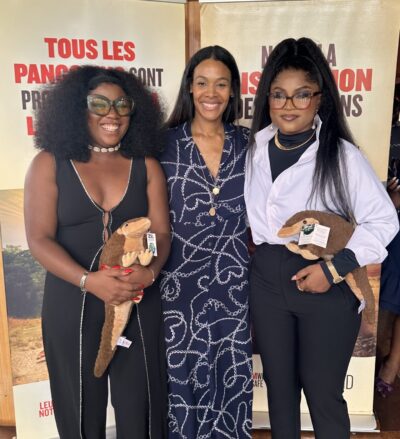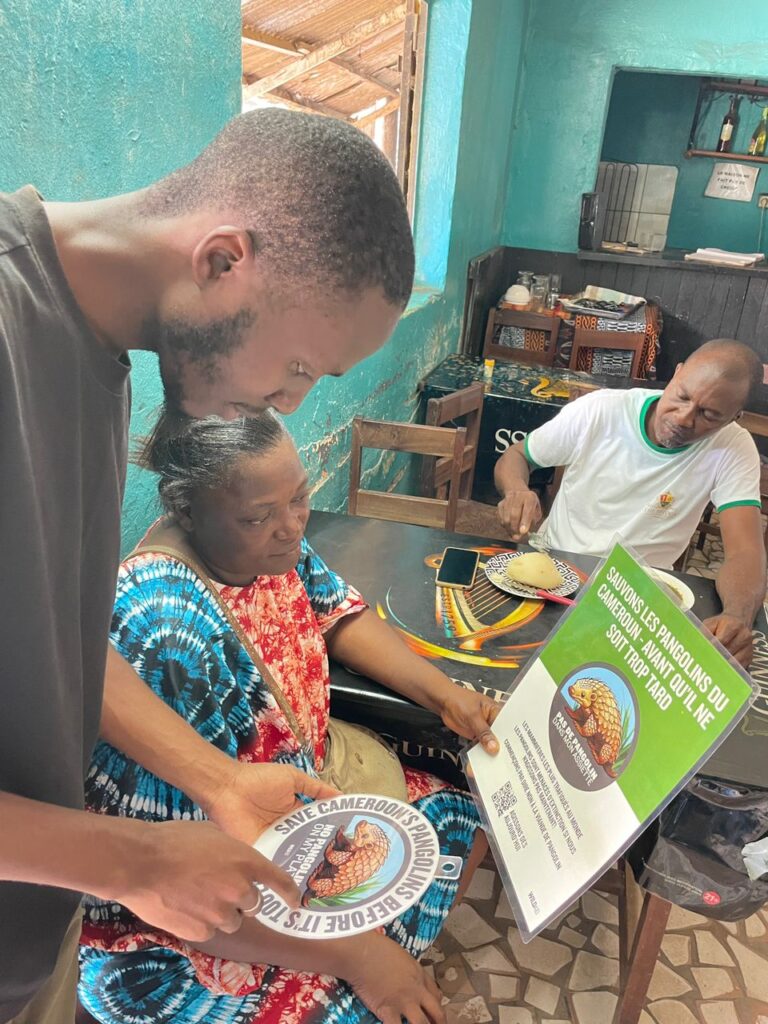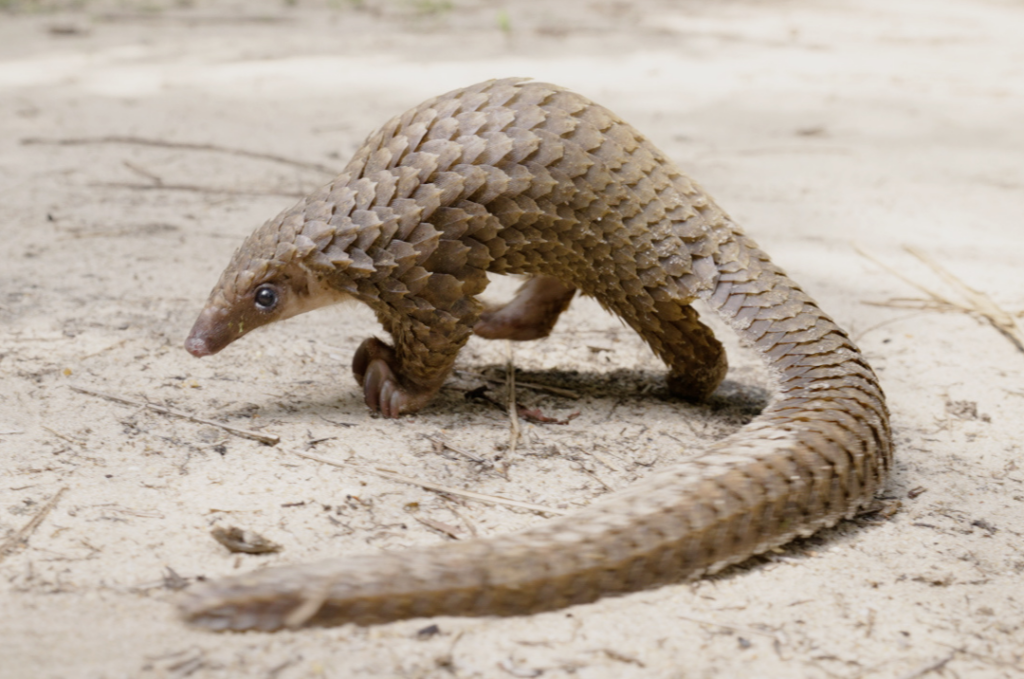
Cameroonian restaurants serving bushmeat and traditional dishes are signing up for a new campaign to protect endangered pangolins by making a public commitment not to serve pangolin meat.
The “No Pangolin on My Plate” (Pas de Pangolin Dans Mon Assiette) campaign launched in the cities of Yaoundé and Douala in June and has already gained the support of 116 restaurant owners. These restaurants are showing their commitment by displaying the campaign logo outside and hanging posters inside to educate customers on the importance of protecting pangolins.
During campaign outreach, campaigners visited 190 restaurants serving bushmeat and traditional Cameroonian dishes. The overall response was very positive, with the majority signing up to the initiative.
Among the 190 restaurants, 68 were found to be serving pangolin meat. Of those, 25 have already joined the campaign—representing 37%—and have pledged to stop serving pangolin meat.
“We’ve been overwhelmed by the positive response to this campaign from restaurant owners,” said Simon Denyer, WildAid’s Africa program manager. “It shows that so many Cameroonians are keen to play a positive role in protecting this country’s incredible natural heritage.”
Restaurants joining the campaign have aligned themselves with ethical and sustainable practices, enhancing their reputation among environmentally conscious consumers and helping to preserve Cameroon’s rich natural heritage.
WildAid will promote these restaurants as pangolin-free through our social media channels and on a website created for the campaign. WildAid ambassadors and influencers will also join the campaign, encouraging consumers to choose pangolin-free restaurants. Together, restaurants and influencers can inspire others to follow suit, creating a ripple effect of change across the community.


“One of the aims of our program is to transform Cameroon’s relationship with pangolins and other species, by linking them to the wider need to protect the country’s forests and the animals that live in them,” said Jennifer Biffot, WildAid’s Francophone Africa Representative. “Pangolins are our main animal ambassadors.”
“If we can convince Cameroonian city-dwellers not to think of pangolins as food but rather as a symbol of the country’s rich wildlife and forests, we can make a major contribution to saving pangolins from extinction in Africa, and at the same time promote a much healthier relationship with nature in Cameroon.”
The campaign was unveiled to the media at an event in Yaounde on Oct 17, attended by Elias Georges Messina, head of the Legal Affairs Unit of the Ministry of Forestry and Wildlife (MINFOF), and two of WildAid’s newest celebrity wildlife ambassadors, singer KRIS M and singer, songwriter, and actor MIMIE, who all spoke passionately about the campaign, pangolins, and wildlife conservation.
Under Cameroonian law, it is illegal to kill, capture, keep or trade pangolins, as all three species existing in the country have been given the strongest Category A protection for endangered species.
A new forestry and wildlife law passed by parliament and signed by President Paul Biya in July has sharply increased the penalties for capturing or killing protected species, leading to imprisonment of 15 to 20 years, or fines ranging from 20 to 50 million CFA francs ($34,000 to $84,000) or both.
This legislative milestone represents a significant step forward in the protection and preservation of Cameroon’s rich biodiversity. It also underscores the government’s commitment to safeguarding the nation’s wildlife and sends a clear message that illegal activities will not be tolerated.
“This symbolizes Cameroon’s commitment to preserving and conserving emblematic species for the benefit of biodiversity and future generations,” said Elias Georges Messina, head of the Legal Affairs Unit of the Ministry of Forestry and Wildlife.
Following the enactment of the new wildlife law, the government moved swiftly to implement its provisions. On August 10, MINFOF agents carried out a surprise operation at the Nkoldongo bushmeat market in Yaoundé, seizing five white-bellied pangolins. A pangolin seller was arrested on the spot, brought before a court, and subsequently sentenced to two years in prison.


Pangolins are shy, nocturnal animals that roll up into a ball when threatened. These “forest guardians” perform a vital ecological role, consuming 20,000 ants or termites a day, or 70 million a year. Using their claws to dig holes in search of ants, they also aerate the soil, encouraging plant growth.
Pangolins are rarely seen in the wild and are difficult to raise in captivity. Yet, they have become the most heavily trafficked wild mammal in the world, with an estimated hundreds of thousands taken from the wild each year in Central Africa. While some are hunted for their meat, the biggest threat comes from the use of their scales in Traditional Chinese Medicine—despite no scientific evidence supporting their medicinal value.
WildAid has been on the frontlines of the fight for pangolins for nearly a decade, launching its first public awareness campaign in 2016 aimed at eliminating demand for pangolins in the world’s two largest markets—China and Vietnam. We employ behavior change campaigns designed to educate consumers and make consumption of pangolin products socially unacceptable, led in China by global celebrities such as Jackie Chan and Wang Yibo.
In 2022, WildAid launched a “Say No to Pangolin Meat” campaign in Cameroon to raise awareness of the plight of the pangolin. The campaign has been led by leading musicians LOCKO and Stanley Enow, leading footballers Rigobert Song, Roger Milla, and Patrick Mboma, and many traditional leaders. The campaign reached millions of Cameroonians and led to a significant decrease in pangolin meat consumption in some of Cameroon’s main cities and towns. The number of people who now understand that pangolins are a protected species more than doubled, while more than two-thirds of urbanites now support the ban on killing or consuming pangolins.
Stay in touch and get the latest WildAid updates.
SIGN UP
